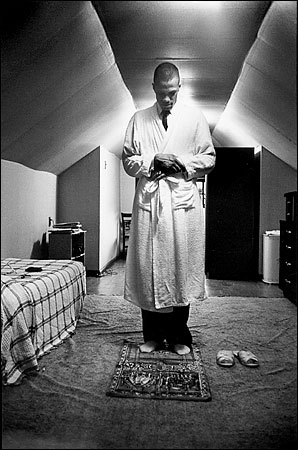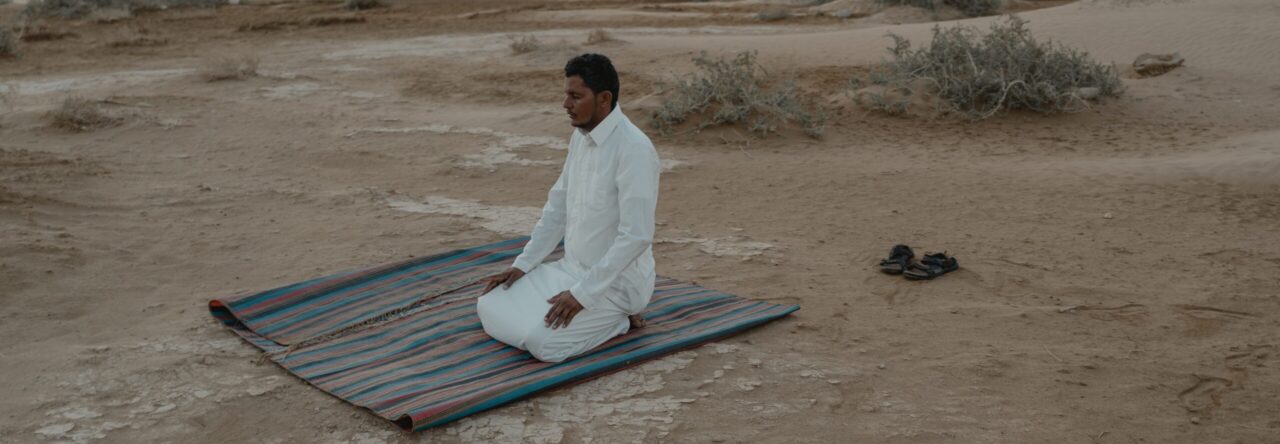Reading Time: 9 minutes
Forced silent in a body the world told him was cursed
When George Floyd was pinned to the ground,
Did he hold on to hope?
That this life of his would be more?
Perhaps Allah accepted this prayer
and exposed America’s hypocrisy,
Once again,
by choosing a Black person
as a catalyst for justice
To be Black in America requires a level of resiliency and hope that cannot be taught in textbooks. It is a lived experience, to endure Muhammad Ali-style jabs and smile without showing blood on your teeth. The Black experience forces one to confront what is at the core of all spiritual transcendence teachings: reform and respect are lifelong struggles and, even when they cannot be found outside oneself, they can and must be discovered by venturing inward.
It’s no coincidence Black Americans are more likely to say they believe in God with absolute certainty (83%) than Whites (61%) and Hispanics (59%). When we look at Islam in the Black community in America, 75% of Black Muslims say religion is very important to them. That is a higher level of commitment than for non-Black Muslims (62%). Black Muslims are also more likely than other Muslims in the US to perform the five daily prayers (55% vs. 39%) proving that Blackness is inextricably linked to faith, and more specifically to Islam. (Pew)
DEEP ROOTS
Islam has been intimately intertwined with African history for thousands of years. Prophet Ibrahim’s wife Hajar, who was a dark-skinned Egyptian, would have been considered Black in today’s society. She not only bore him a Prophet, but the actions of this Black woman were so loved by Allah, He ordered every capable Muslim until the end of time to literally follow in her footsteps and deemed the Hajj pilgrimage unacceptable without doing so.
Shortly after the Prophet Muhammad ﷺ was born, his mother Aminah sent him into the desert, as was tradition among the great families of the time. The belief was that by living in the desert, one would learn self-discipline, nobility, and freedom. During this time, the Prophet Muhammad ﷺ was nursed and cared for by Halima, a Black woman.
Before Islam was accepted in any Arab society, it was first established in Africa. The first journey of the Prophet Muhammad’s ﷺ earliest followers to protect the message of Islam was to Abyssinia, present-day East Africa. It was here where Muslims were first welcomed and allowed to establish a community in which they could practice Islam freely, without the persecution of the Arabs. Najashi, the king of Abyssinia, converted to Islam at the time of the Prophet Muhammad ﷺ and offered Muslims safety in his lands.
Bilal ibn Rabah, the famous and beloved companion of the Prophet Muhammad ﷺ, was a Black slave who accepted the message of Islam. He was publicly and gravely beaten by his Arab master for his conversion. The Prophet ﷺ sent Abu Bakr, another notable companion, to negotiate Bilal’s emancipation after which Bilal was freed. He then went on and became Islam’s first muezzin, or caller to prayer. Honor was not solely reserved for the light-skinned or wealthy in a society, as evidenced by Bilal’s life. So respected was Bilal as a Muslim leader that later in his life he was chosen as the governor of Syria.
For Islam to truly be a religion for all of humanity until the end of time, questions regarding race relations and social hierarchies must be met with explicit and divine instruction. Over 1400 years ago, the Prophet Muhammad ﷺ said, “O people, your Lord is One and your father Adam is one. There is no favor of an Arab over a foreigner, nor a foreigner over an Arab, and neither white skin over black skin, nor black skin over white skin, except by righteousness. Have I not delivered the message?” (Musnad Ahmad 22978)
Long before the Declaration of Independence laid claim to the fact that “all men are created equal”, Allah proclaimed in the Quran, “O people, We have created you male and female and made you into nations and tribes that you may know one another. Verily, the most noble of you to Allah is the most righteous of you. Verily, Allah is knowing and aware” (Quran 49:13). And “Among His signs is the creation of the heavens and the earth and the diversity of your languages and your colors. Verily, these are signs for people with knowledge.” (Quran 30:22). Thus, Allah makes it evident that our differences are signs of His creative power, and that piety is the supreme indicator of human status. Such foundational statements about human equality are undoubtedly key factors in the global spread of Islam.

New York City 1964
In the 1960s, Malcolm X urged America to understand Islam because as he said, “It is the only religion that erases from its society the race problem.” He traveled throughout the Muslim world and interacted closely with people who “in America would have been considered White, but the White attitude was removed from their minds by the religion of Islam.” This is the beauty of Islam when we are courageous enough to follow it as it was revealed.
THE ROSE THAT GREW FROM CONCRETE
America was built on a foundation that prized power and profit over human life. From slavery, to the Abolitionist Movement, to the Civil Rights Movement, and now the Black Lives Matter Movement, Blacks have fought for just treatment in America since the very beginning. All the while, those holding power have and continue to build systems that keep Blacks subservient and oppressed.
Slavery may be illegal today, but America’s opinion and treatment of Blacks is most shamelessly obvious with even a cursory glance at the US prison system. Today, the US constitutes 5% of the world population but 21% of the world’s prisoners. Blacks are incarcerated at a rate five times more than Whites despite being less than a sixth of the total US population. Even upon release from prison, the negative impact of a criminal record can stigmatize a person for life, reducing the likelihood of job offers by half, limiting travel due to denied passport or visa applications, hindering one’s ability to qualify for loans, and even stripping citizens of their right to vote. (NAACP)
The New Jim Crow, written by Michelle Alexander in 2010, is a monumental expose on the US prison industrial complex. Quickly becoming required reading material for many college courses, her research outlined the ways America’s War on Drugs (introduced soon after the Civil Rights Movement) further fortified a racialized caste system in the country. If incarceration trends continue, Alexander predicts America will soon imprison one-third of its Black male population. Given that Whites are more likely to commit drug-related crimes than people of color, she concludes that the primary targets of America’s policing structure are race based and therefore mass incarceration must be addressed side-by-side with racial justice.
Prisons, interestingly, occupy a unique crossroad in the narrative of Islam in America. In past and present pop culture, movies, and books, the prisoner-turned-Muslim is a classic American story. 80% of convicts who ‘find faith’ in prison choose Islam, the majority of those being Blacks, and a growing Hispanic population. (University of Arizona) As the prison population continues to grow, so too is the massive captive audience willing to listen to the message of Islam. Like Malcolm X, many prisoners first come into contact with Islamic teachings while incarcerated and many of them will walk the same path as he to racial redemption.
Adults and juveniles, gang members and ex-members, violent and nonviolent offenders are being introduced to a religion that speaks directly to their racial experiences. These people society has deemed as outcasts, are taking their first steps on a path that leads to a more racially balanced worldview. Islam is the message Malcolm X heard when he needed it most, and it sent him on a journey that made him revise some of his most deeply held racial convictions. His life story left behind a blueprint for future generations of converts to follow. Like him, many Blacks who have experienced self-loathing and anger have been allured by the notion of Black divinity. Islam, however, unequivocally rejects race-based theology as it does the blanket condemnation of Whites or any other racial group. This life-altering change in consciousness exemplifies just one of the ways Islamic values can positively impact American culture.
THE CALLING
What we are seeing today with the Black Lives Matter Movement is the reemergence of a powerful protest building on centuries of activism and consciousness-raising by exposing the unrelenting injustices being committed by America’s arrogant. The Prophet Muhammad ﷺ educated us about this when he said, “Shall I inform you about the people of paradise? They comprise every obscure, unimportant, humble person, and if he takes Allah’s Oath that he will do a thing, Allah will fulfill his oath (by doing that). Shall I inform you about the people of the Fire? They comprise every cruel, violent, proud and conceited person.” (Bukhari 6071) These words are a crucial guide for anyone searching for truth in conflict situations, as with race relations in America. It is also a source of comfort for those who may feel defeated and powerless to know that with hardship and humility come great reward.
Perhaps it is the divine calling of Black America to be the carries of truth in the face of corrupt power, only Allah knows. Despite endless persecution and even death, Black America persistently models resistance against unjust power with a faithful determination that inspires people around the world to take notice and do the same. As American Muslims, these are our brothers and sisters in righteousness, as our faith instructs us to support truth and justice wherever there may be struggles against it. Today we have an opportunity to support the movement against systemic racism. At the very minimum, we must give voice to the problem, as the Prophet Muhammad ﷺ said, “The best fighting in the path of Allah is to speak a word of justice to an oppressive ruler.” (Abu Dawud 4344).
Allah defines the core purpose of human life on earth as an internal and external battle between truth and falsehood. He promises us that truth will always prevail, and therefore our success lies in standing for the truth even if it is against our own selves and that which we love. As Martin Luther King said, “The moral arc of the universe is long, but it bends towards justice.”
O Allah, show us all the true path and keep us on it, strengthen us with it, bless us with it, and protect us from a life away from it. Ameen.
Shakeela Najjar is a marketing director in New York City, with a Masters degree in Digital Media Advertising from Boston University. In her free time, she engages many forms of the creative process to explore the intersection between American culture, womanhood, and Islam.
